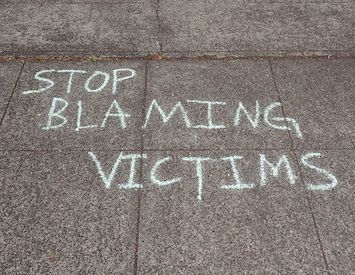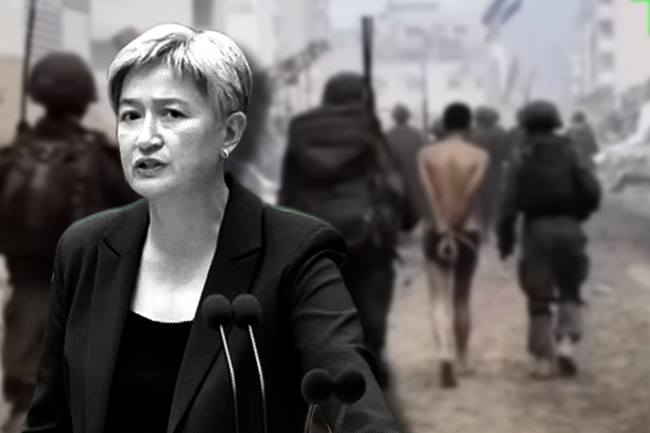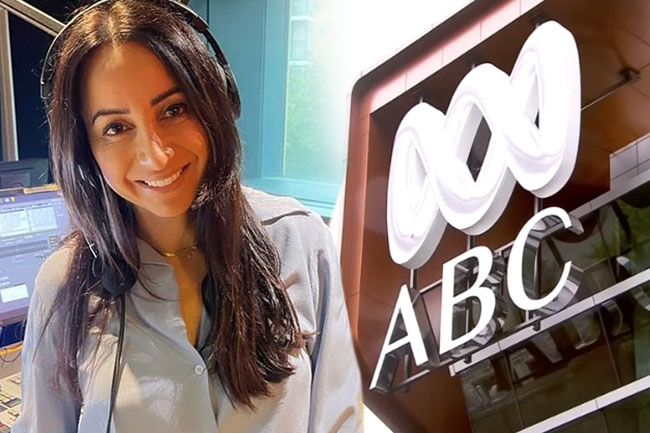Dr Jennifer Wilson's own account of sexual abuse survival acknowledges Grace Tame, whose fierce courage in telling her story helped free memories for Wilson that inspired further healing.
*CONTENT WARNING: This article discusses rape and sexual abuse
I WENT TO St Michael’s Collegiate school in Hobart, at a very different time from Grace Tame. Grace’s story and in particular the references to the school have stirred memories I thought no longer had the power to move me.
I want first to acknowledge Grace’s experiences and her steadfast telling of them and have it noted here that the recounting of her story by a woman can sometimes break through the defences of those of us who have survived, and in turn free our voices.
When I was at St Michael’s, or Collegiate as we called it, the school was run by the Community of the Sisters of the Church, a group of Anglican nuns. I was sent there not because my family was particularly interested in high Anglican ideology, but because it was a school with a strong reputation for educating girls and apart from that, I needed to be got out of home and it was a boarding school. My story is also one of childhood sexual abuse, not by a teacher but my stepfather.
"If I’d known what was happening, I would have stolen you."
We lived in the small east coast village of St Marys, where my stepfather was the local doctor. He was also a lay preacher in the Methodist church where he played the organ on Sundays. He was a much-liked, even revered figure in the community.
Many years later, in one of the confounding synchronicities life can occasionally present, I met Gwynneth, who was a nurse at the small hospital in St Mary’s when my stepfather worked there. We established that Gwynneth knew me when I was a child. She visited our house for dinner, though I do not remember these occasions.
"What was I Iike?" I asked her, as this was the period when the rapes had just begun and I have no memory of myself.
She said:
"You were quiet. Shy. If I’d known what was happening, I would have stolen you."
I asked her: "What was he like?"
She told me:
"We thought he was a very good doctor. He let us do things nurses weren’t supposed to do. He encouraged us."
I hated her for a moment for speaking well of him.
St Michael’s was for me a sanctuary, a refuge from a home where there was no peace to be found, no respite from fear, a house of life-threatening violence and unpredictable adult fury.
At St Michael’s I slept safely in the knowledge that I would not be disturbed either by the sounds of heavy footsteps thudding down the hallway and my mother’s screams, or my stepfather pulling back my bedcovers to slip in beside me. At the dining table at St Michael’s I was permitted to leave food I could not eat. I was allowed to like and dislike.
The only times I knew fear were when I received the fortnightly notes from my stepfather telling me which day he would visit to take me out for a drive. Then it would start again — the cold in my belly, the wakeful nights, until the visit was over and I knew there’d be respite until the next time.
It felt like happiness after it was over — the euphoric relief. I thought it was happiness and this misunderstanding distorted my perception of how things should be between people for a long time.
This situation continued for some five years. In my 15th year, something gave way in me.
I had for many months imagined how it would be to tell someone of my secret life. I knew whom I would choose. Her name was Sister Elizabeth May.
At this time the nuns wore full black habits with white wimples, we saw neither their hair nor their ankles and their waists were bound with wooden rosaries. I never found them intimidating, though I expect it would be quite difficult to intimidate a girl who knew as much as I did about the terrible things that can be done by adults.
I experienced only kindness from these women. Though they knew nothing of my story, my distress expressed itself in sleepwalking, nightmares and a complete inability to learn, though, obviously, I was not stupid. Children aren’t stupid, despite what some adults may think.
The only thing I could do with any confidence was to play the piano, which I had been learning since I was five from, confusingly, my stepfather who proved to be an excellent teacher. Sister Elizabeth May used to sit with me of an evening when I was practising. She sat near the piano, knitting black mittens for the winter. She suffered terribly from chilblains. I’m quite sure she knew something was badly awry.
One evening, I said:
"What happens if you forgive someone 70 times seven and they still do something wrong?"
She asked:
"Who are you forgiving?"
So I told her. Everything.
And was believed.
Which in itself was quite remarkable for the times — which were before these things were spoken of. Before mandatory reporting, so Elizabeth May did not have to go to the police with my story.
Instead, she went to Sister Jessica, the headmistress, a formidable figure we girls did not know well. I was called to her office. Elizabeth May came with me. I cannot remember Jessica’s questions, I remember only her gentleness and how much I wanted her to take me on her lap. She didn’t, of course, but she did stroke my hair and pray for us all.
Later, I learned that the sisters took their dilemma – and what a dilemma it was at that time, with no framework of regulations within which they could seek guidance – to the Dean of Hobart, Michael Webber. The Dean was a frequent visitor to the school; we knew him well.
Between the three of them, they formed a plan to confront my stepfather and mother — yes, my mother knew of all this from the start. But that’s another story. They decided to brief a lawyer who also attended the confrontation. I have no idea what passed between the four of them, but I do know that not one of them ever questioned the veracity of my story.
I was believed.
"I only know they loved me when I was lost and alone, and full of terror."
On the day of the confrontation, it was decided I would be sent to spend the afternoon with one of the secular teachers who had a house in the school grounds. They wanted me safe and out of the way. I spent the day in terror. I was afraid he’d find me. I was afraid he’d kill my mother if he couldn’t find me.
I was afraid of breathing.
I can’t remember anything of that day apart from the feelings. At some point, Elizabeth May fetched me from the house and took me to see Jessica. Together they told me my stepfather had admitted the truth. I would not have to go home again, they said. I would not have to endure anymore. I remember the relief. I remember I cried because I didn’t have a home. I remember I feared he would kill my mother and my baby sisters because of what I’d done.
Many years later they told me they’d given him an ultimatum. Either he gave the nuns charge of me, or they’d report him to the police. Of course, my parents agreed to relinquish me.
In retrospect, this seems a remarkably sophisticated way to deal with a situation that was bizarre for its time — not in the sense that it didn’t happen often, because I am sure it did, but because nobody ever did much about it, especially not the churches.
I don’t know if they made the right decision or not, or even how to gauge that. I only know they loved me when I was lost and alone, and full of terror.
And so St Michael’s Collegiate School became my home — the Sisters of the Church my guardians.
In the holidays, other girls would invite me to stay with them. Nobody knew why I couldn’t go home and I invented a story of parents travelling overseas. Sometimes I didn’t want to go to friends’ homes because I couldn’t reciprocate and then the nuns would let me stay at school. They took me out with them on picnics and trips up Mount Wellington.
I had a record player, books and a lot of pianos all to myself. At night, Elizabeth May or Jessica would bring me warm milk and sit with me until I fell asleep. I was free to roam all over the school and the boarding house and I was, for brief intervals, happy.
Grace Tame, with her fierce courage and her shining spirit, freed in me these vivid remembrances, and for that, I am deeply grateful. Today, for the first time in many years I’ve cried for my Jennifer and her plight at that time in our life.
This is what we can do for one another, those of us who survive.
I believe the nuns saved my life. I believe they taught me truths I would never have known, were it not for their influence.
If I could speak to her I would tell Elizabeth May that I still play the piano. I would tell her of my granddaughter, Mabel Jane – who is the child most like me – and whose young life is full of promise and safety and love. I would tell Jessica I have learnt that our children and their children can heal us in ways we could never have anticipated.
I would tell them that though once I was without both family and home, through their love and care they gave me the chance to grow into a woman who could make for herself her own home and family, and live in profound contentment. This, I would tell them, is what you gave to me, and to Mabel Jane, and I will be grateful for this all of my days.
If you would like to speak to someone about sexual violence, please call the 1800 Respect hotline on 1800 737 732 or chat online.
Dr Jennifer Wilson is an IA columnist, a psychotherapist and an academic. You can follow Jennifer on Twitter @NoPlaceForSheep.
This article was published by No Place For Sheep under the title 'Let the healing fountain start...' and is republished with permission.
Support independent journalism Subscribe to IA.















